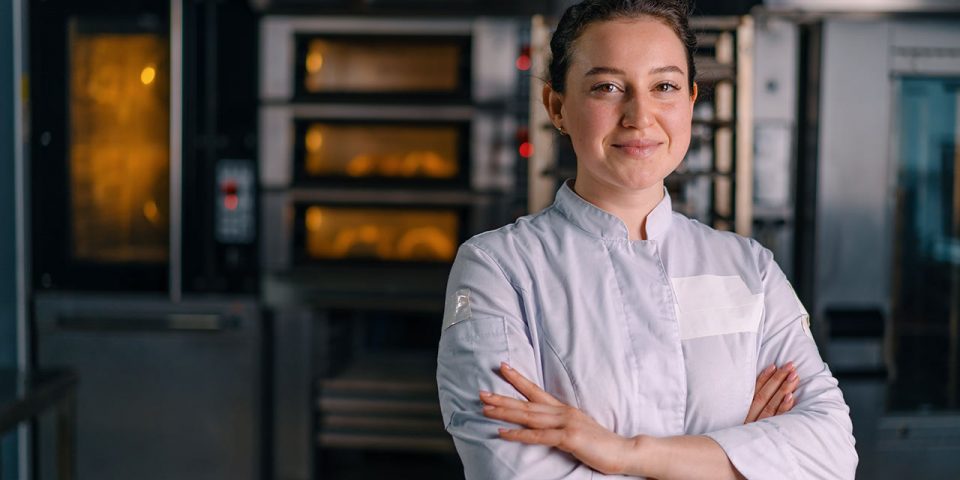Executive Chefs are the backbone of any kitchen, leading teams and ensuring everything runs smoothly. This article explores how certifications help Chefs excel and breaks down how many certified Executive Chefs there are across the US.
What Does Certified Executive Chef Mean?
A certified Executive Chef is a culinary professional with more than five years of experience working in a food service establishment and a proven track record in expense tracking, staff supervision and strategic planning.
Organizations that provide Executive Chef certifications
The American Culinary Federation (ACF) and the World Association of Chefs Societies or Worldchefs are the two most recognized institutions that offer Executive Chef certifications.
American Culinary Federation
ACF was established in 1929 by three different Chef groups, including the Chefs de Cuisine Association of America, the Société Culinaire Philanthropique and the Vatel Club. It’s primarily recognized for the exam-based certifications it offers.
This means that Executive Chefs, Pastry Chefs and Private Chefs can only get certified when they’ve passed both written and practical exams. Currently, ACF offers 14 certification programs:
- Certified Fundamentals Cook
- Certified Culinarian
- Certified Sous Chef
- Certified Chef de Cuisine
- Certified Executive Chef
- Certified Executive Pastry Chef
- Certified Master Chef
- Certified Master Pastry Chef
- Certified Working Pastry Chef
- Certified Pastry Culinarian
- Certified Fundamentals Pastry Cook
- Personal Certified Chef
- Personal Certified Executive Chef
- Certified Culinary Administrator
World Association of Chefs Societies
Worldchefs was established a year earlier than ACF in Paris, France.
Unlike ACF, its certification process is portfolio-based. In other words, you need to present a portfolio that showcases your competencies and professional experience to earn certification. As of 2025, they offer nine certification programs:
- Certified Master Chef
- Certified Master Pastry Chef
- Certified Culinary Educator
- Certified Executive Chef
- Certified Pastry Chef
- Certified Chef de Cuisine
- Certified Sous Chef
- Certified Chef de Partie
- Certified Commis Chef
Educational Background of Certified Executive Chefs
Understanding the educational qualifications of certified Executive Chefs offers insight into the pathways leading to this esteemed position. A significant number of executive chefs have pursued formal education to hone their culinary skills. Notably, 56% of Executive Chefs hold an associate’s degree, reflecting the importance of structured culinary programs in their professional development.
Employment Tenure and Industry Distribution
Examining the employment patterns of certified Executive Chefs reveals trends in job stability and industry engagement. Approximately 15% of Executive Chefs remain in the same position for up to one year, indicating a dynamic career landscape with opportunities for advancement or transition. Also, 24% of executive chefs are employed in companies with fewer than 100 employees, highlighting the prevalence of executive chef roles in small to medium-sized enterprises.
How Many Certified Executive Chefs Are There?
There are currently 172,370 Chefs working in the United States, but it’s difficult to estimate how many of them are certified. What we can tell you are some statistics about the ones who are certified.
Based on our research, 22.6% of certified Executive Chefs are women and 77.4% are men.
This graph is interactive. Hover your mouse over different parts of the graph to see detailed data.
Furthermore, the average age of Executive Chefs who obtained certification is above 40 years old.
This graph is interactive. Hover your mouse over different parts of the graph to see detailed data.
The exact number of certified Executive Chefs in the United States isn’t readily available since applications are open year-round, making it difficult to track the total. Also, ACF and WorldChefs don’t publicly share data about their certified Executive Chefs.
Requirements To Apply as a Certified Executive Chef
Below, we’ve listed the requirements to apply, the step-by-step process and tips for increasing your chances of earning certifications for both ACF and Worldchefs.
Education requirements
Those applying for ACF certification must have one of the following:
- High school diploma and 150 continuing education hours
- 250 continuing education hours
- Associate’s degree in culinary arts
- ACFEF apprenticeship program
In addition, they must also have completed at least 30 hours of learning the following courses:
- Nutrition
- Food safety & sanitation
- Supervisory management
- Beverage management
- Cost control management
As for work background, ACF requires at least five years of experience working as a Chef de Cuisine, Executive Sous Chef or Chef in a restaurant or hotel setting. Additionally, applicants must have experience managing a minimum of five culinary staff. All this experience must be within the past ten years.
Since Worldchefs isn’t exam-based, it doesn’t explicitly state the educational background and job experience needed to apply. Instead, they use a questionnaire to determine if you’re eligible for certification. Skills like familiarity with kitchen equipment such as Chef knives might pop up on the questionnaire.
How to apply
To apply for certification as an Executive Chef at ACF, fill out the application form and submit it together with proof of your education and work experience. As soon as you receive approval to proceed with your application, you need to schedule both written and practical exams.
But before setting a date, you need to prepare ahead to get a passing score. ACF offers study guides that you can use to review and practice. You can also look at some of the most common Executive Chef interview questions, which might refresh your memory and help you out when taking the exam.
Based on the past experiences of those who have taken ACF certifications, the written exam is going to cover the following topics:
- Nutrition
- Ingredients
- Cooking methods
- Cost control
- Operation management
- Food safety and sanitation
As for the practical exam, you’ll be assigned to put together a three-course menu with a time limit.
To prepare, you can practice making the dish in your kitchen and ensure every move is deliberate while being mindful of safety and sanitation practices.
Finally, once you’ve completed both exams, you must submit the final application with copies of your exam sheets and pay the application fee, which is $250 for ACF members and $490 for non-ACF members. Once this is approved, you will receive your certification by mail.
Worldchefs shares some basic steps, such as filling out the application form and submitting it together with supporting photographs, documents and certificates related to your education and work background. After submitting these materials, wait for feedback as they assess your experience, skills and knowledge.
If the evaluators find your portfolio satisfactory, you will be issued a certification. It’s important to bear in mind that all kinds of Chefs can apply for a certification, not just Executive Chefs.
Benefits of Getting Certified as an Executive Chef
Although data on the number of certified Executive Chefs isn’t available, pursuing certification still offers significant advantages compared to not being certified. Even though you can get a job as a Chef without certifications or culinary education, they can come in handy when asking for a raise, promotion or seeking a job in a different company.
For one, the culinary arts industry is a competitive field and pursuing further education through certifications is one way to stay ahead. Certifications can also help you by equipping you with the skills and knowledge needed to become a Michelin-star Chef.
Aside from making sure you stay current with all the latest culinary techniques and advancements, here are other reasons why you should consider getting certified as an Executive Chef:
- Formally validates your skills, expertise and adherence to industry standards on your resume
- Provides networking opportunities
- Adds credibility, boosting the reputation of the restaurant you’re managing
- Sets the standard for the rest of the kitchen staff that they should always pursue continuing education
FAQ: How Many Certified Executive Chefs Are There
ACF certifications are exam-based, requiring candidates to pass written and practical tests, while Worldchefs certifications are portfolio-based, emphasizing professional experience and achievements.
Certifications can significantly boost an Executive Chef’s earning potential by validating expertise, making them more competitive for high-paying roles, promotions, and raises.
Certified Executive Chefs often advance to roles like culinary directors, restaurant owners, or educators in culinary institutions, leveraging their certification to demonstrate leadership and expertise.
Globally, certification processes may place greater emphasis on regional cuisines, local regulations, and portfolio-based assessments, as seen with Worldchefs, compared to the exam-centric ACF process.
Common challenges include balancing work commitments with preparation time, the cost of certification fees and study materials, and mastering the diverse topics covered in exams or portfolios.

Written by Rea Gierran
With a background in Communication Arts, Rea’s expertise lies in content marketing and copywriting. Her published works can be seen on online news websites such as Rappler and Adobo magazine. Outside of her work, Rea takes on the role of a “momager” for Shiro, a TikTok dogfluencer.

Reviewed by Marcy Miniano
Marcy is an editor and writer with a background in public relations and brand marketing. Throughout her nearly decade-long career, she has honed her skills in crafting content and helping build brands across various industries — including restaurant and hospitality, travel, tech, fashion and entertainment.




